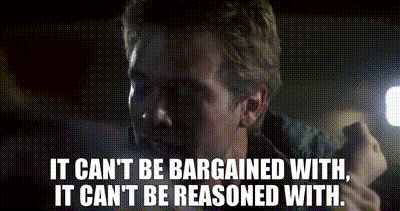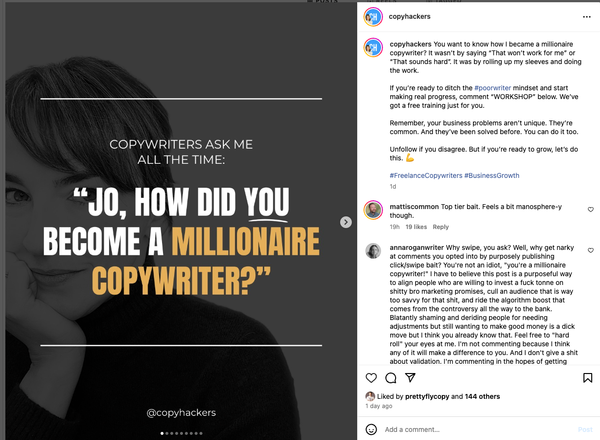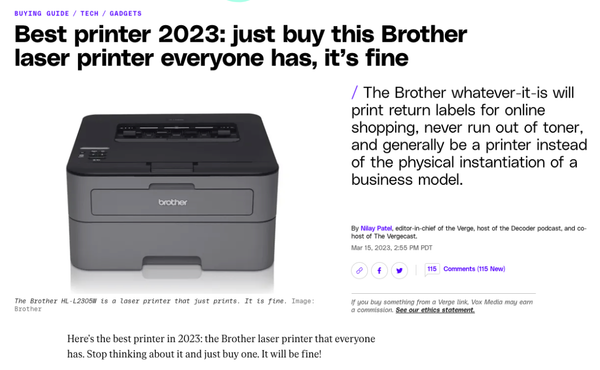Serial killer-themed ad campaign claims clients entire business as victim
After consumers complained about a single ad, a life insurance company is legally barred from accepting new customers. It's a potential corporate death sentence for DeadHappy.
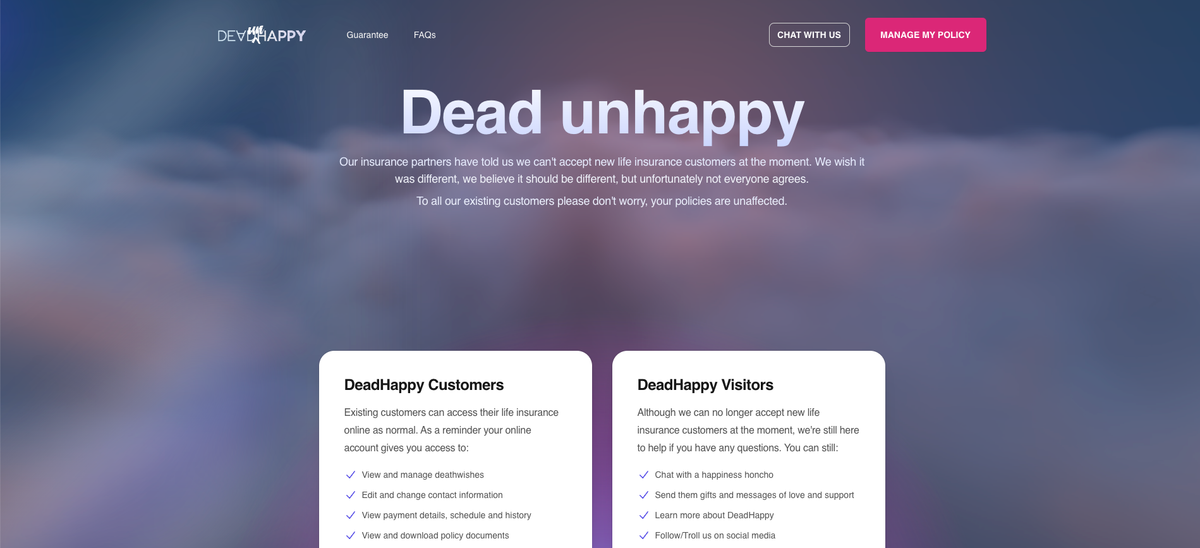
Ever heard of DeadHappy? If not, this may be your first and last time. An entire business is likely going to fold due to a single social media ad that was up for less than a single day. It's a terrifying story that's more about the random destructiveness of outrage culture than something marketers could actively prevent – and that's the scariest part.
DeadHappy is a UK-based company offering no-exam life insurance policies. It's similar to companies like Lemonade or Hippo that provide a hip, user-friendly way to get term life insurance coverage without the hassle.
What makes DeadHappy different is that its brand embraces the cold embrace of death and says, "Is that all you got?" Their marketing pokes fun at how uncomfortable society is with a topic that affects everyone, ever, using genuinely fun lines like "Life insurance to die for" and fun prompts to aid end-of-life planning:
"When I die..."
"When I kick the bucket..."
"When I pop my clogs..."
They also teamed up with a zombie video game to promote "Zombie Insurance".
As much as I wanted to do the cynical, "Ha ha look at these dopes" thing, the more I looked into the business, the more I liked their approach. Founded after the CEO couldn't get life insurance due to having been diagnosed with depression, the company's mission to change attitudes about death seems genuine. And their approach was remarkably human.
So it's especially a shame that the company might be at its end due to a single short-lived ad. Here's the TLDR via Decision Marketing:
Financial services firm DeadHappy is counting the cost of last year’s controversial ad campaign featuring serial killer Harold Shipman – which was branded “disgusting” by one MP – after being forced to shut its doors to new customers following a mass exodus of insurance partners.
The activity, which ran on social media, featured a picture of Shipman alongside the tagline “because you never know who your doctor might be”.
Following a major backlash, including from relatives of Shipman’s victims and Hyde MP Jonathan Reynolds branding the ad “disgusting”, DeadHappy scrapped the activity.
According to Health & Protection, "DeadHappy took the ads down at 8am on 24 January, barely 24 hours after going live, adding that it was 'never their intention to offend' and that once it became clear that the ads were causing offence, they removed them."
But despite these ads only being up for a matter of hours, the snowball effect and outrage journalism seems to have completely cut the company's lifeline.
What Actually Happened?
I've spend several hours trying to put together a rough timeline of what happened to DeadHappy to hopefully learn what went wrong and how to avoid the same thing happening to one of my clients or me, if possible.
Most of their brand content pokes fun at the seriousness of death, or at least the social norms around it. Here's an example of a Facebook post:
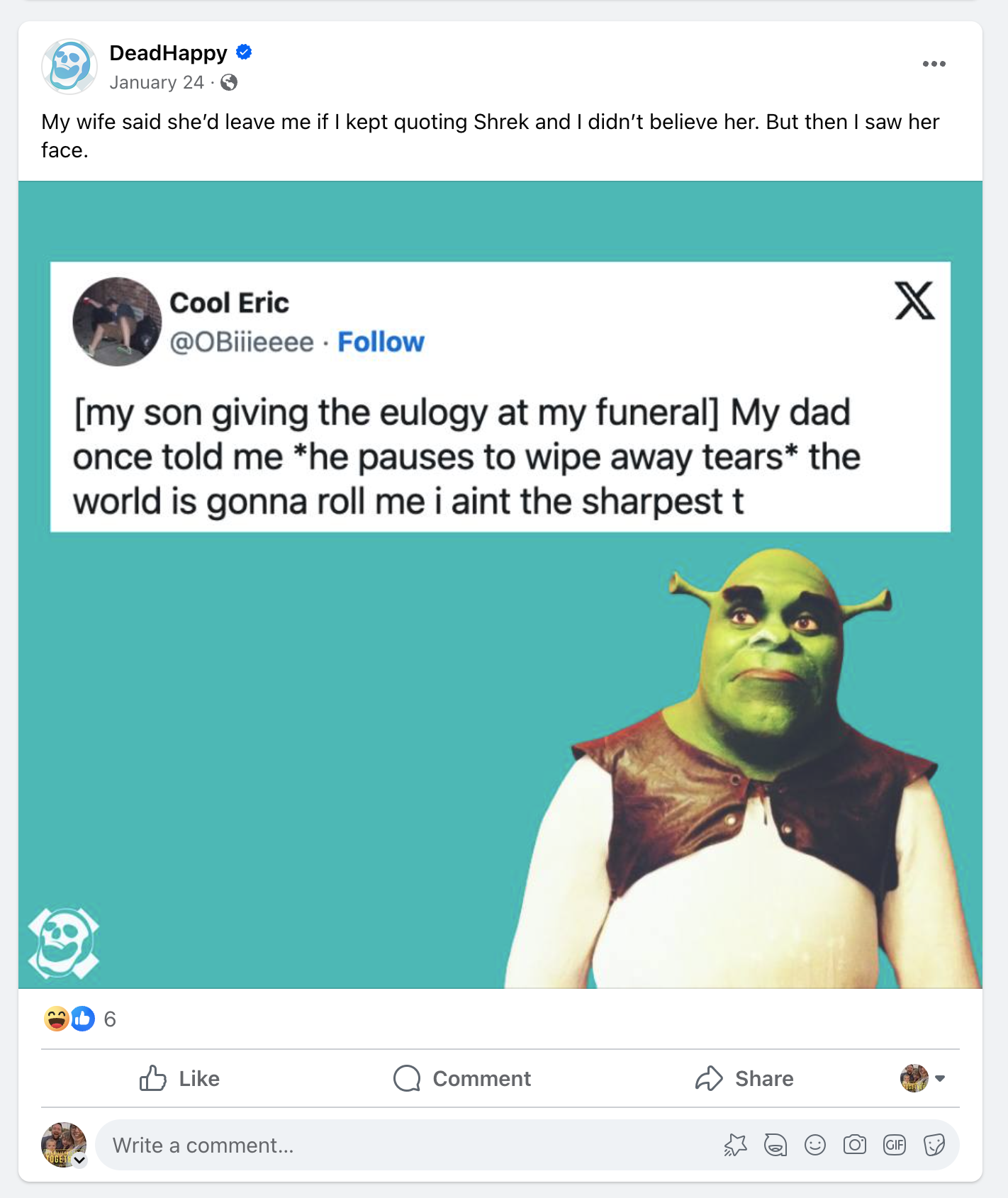
It's not the usual life insurance content, but it's pretty tame compared to some of the anarcho punk accounts I typically follow. It's not even the edgiest death-themed brand content. (That honor belongs to the other death-themed brand, Liquid Death, which recently collaborated with Blink 182's Travis Barker to sell an "Enema of the State Collectible Enema Kit".)
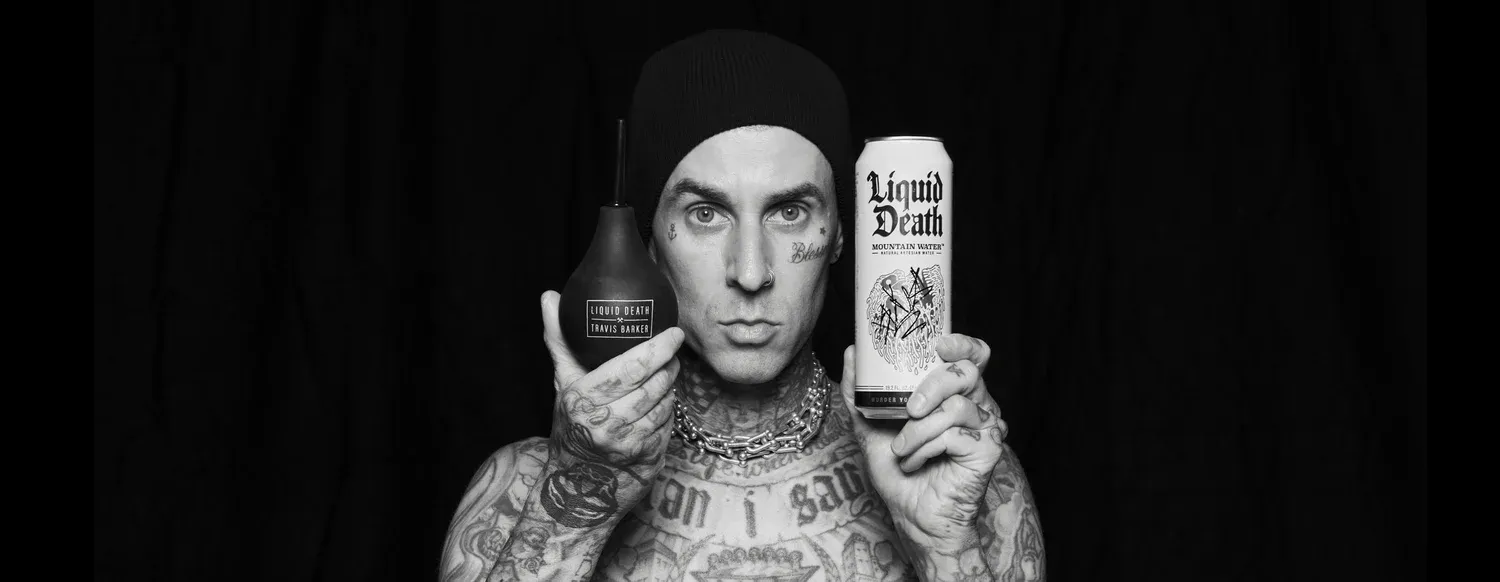
While DeadHappy's content isn't getting a ton of engagement – between 15-50 likes per post – they were apparently doing well on TikTok. It's the kind of "edgy" brand that makes middle-aged, middle-managers feel a flutter of life by choosing the "risky, run" financial services firm.
Think Cards Against Humanity meets life insurance, and you get it. Honestly, I'm struggling to see how someone would be offended enough to call the official British ad Police, the Advertising (sic) Standards Authority (ASA).
But at least 115 people saw fit to fill their mornings complaining about the ad
And that's what scares me.
It's not like DeadHappy was a massive target running their ads on every billboard and bus stop. They were just another small, scrappy company with good branding. Just like you! ☠️
A Timeline of DeadHappy's Doom Spiral
Living up to its branding, DeadHappy had invited controversy in the past when its "Life insurance to die for" campaign which the UK's Advertising Standards Authority (ASA) said "trivialised" (sic) suicide and depression. I disagree and don't think it's offensive at all. It's kind of funny and at least makes it memorable.
But I'm also the kind of person whose home is decorated with sugar skulls and posters that say, "You are going to die, so please have a nice day!" So I'm probably closer to being in the target audience than not. From what I can tell, the entire debacle started around January 24, 2024.
January 2024: DeadHappy starts running ads featuring Shipman's image and the text, "Because you never know who your doctor could be." These were apparently Facebook and Instagram ads, but they are no longer visible from the Meta Ads manager. First covered in FTAdvisor, the story was re-reported in outlets like Yahoo! Finance:
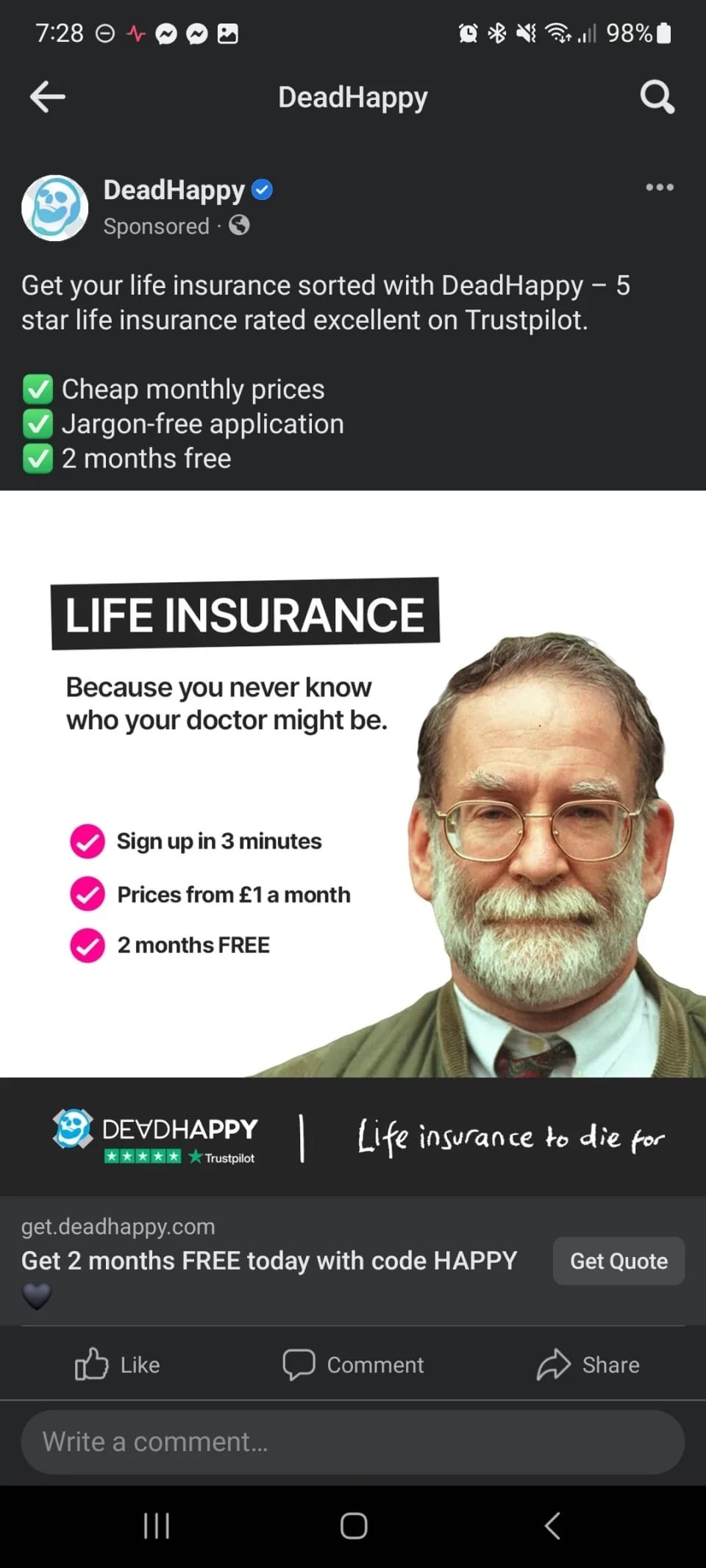
Shipman never came clean about why he did murdered scores of people, leaving behind a horrific lack of resolution for the still-living families of the victims. I can imagine someone complaining. But it seems that what really happened was a story got picked up, then picked up again, then re-rereported by the BBC, and spiraled from there.
January 25, 2024: After coming under fire from the public, DeadHappy's founder Andy Knott defended the ad and claimed they wanted people to "stop and think". That's precisely the line business leaders use when they think negative attention will go away on its own. (It did not.)
Meanwhile, DeadHappy's risk carrier Shepherd's Friendly became aware of the controversy and instructed the company to remove the ad as it did not align with their values. All future ads must now by run by Shepherd's Friendly before going live, which is likely a huge PITA.
The families of Shipman's victims also speak out against the ad.
Somehow all of this has happened in less than 3 calendar days.
January 26, 2024: DeadHappy finally does some "stopping and thinking" of its own and apologizes for the ad. At this point, the UK's Advertising Standards Authority (ASA) has had more than 50 complaints.
February 15, 2024: The ASA bans DeadHappy from using those ads. This is not the first time DeadHappy has been censured for its ads.
March 18, 2024: DeadHappy changes its URL to deadunhappy.com and posts a statement explaining, "Our insurance partners have told us we can't accept new life insurance customers at the moment. We wish it was different, we believe it should be different, but unfortunately not everyone agrees. To all our existing customers please don't worry, your policies are unaffected."
That's terrifying. A single bad ad, and the business becomes unable to legally accept new customers within a matter of weeks. And it probably could have happened to any of us.
Post-Mortem: How did this happen, and could it have been prevented?
Offensive ads run every single day. Any marketer having the slightest bit of fun runs the risk of offending someone, probably. So why did this one end up being so damaging?
I wasn't in the room. But I know how these kinds of ad decisions get made at small companies. And there probably wasn't much of a decision at all. The entire conversation was likely something innocuous – the kind we've all had at some time or another:
"Hey here are the ads we're going to run for the next month. We're testing out this theme about famous serial killers like 'oh you can't trust your neighbor' as the concept."
"Brilliant, let us know how it goes."
It's the mundanity that gets me. The idea's not terrible on its face. It's not violating to the brand messaging. Nor is it being especially mean or crass.
The only thing I can come up with is that the people who really needed to get on board with the branding were the finance people. Finance people are incredibly boring and risk-averse. Once, during a short-term contract at a giant bank, I spend 36 hours/week in meetings doing various risk reviews.
(Spend two weeks inside a major corporate bank and tell me you don't feel dumber, I dare you.)
The risk aversion inside giant companies kills innovation. It destroys good ideas. And it steals joy from children. But it's what they're used to. It makes these corporate cowards feel safe, because the world is scary, and what if they make the wrong decision?
It's this same impulse, I think, that caused the Shepherd's Friendly people to overreact. They're so risk averse, they'd rather kill a solid business than have someone be mean to them.
Outrage culture can strike at any time, and that's a problem
The finance stooges getting cold feet is only half the equation. The other half is the ragebait news cycle that we're still, STILL falling for, even though it makes otherwise decent people to turn off their brains.
I have no problem with people facing consequences for their actions. (Like I tell my kids, you can't pick up just one end of a stick.) My problem is when "the backlash isn't proportional to the crime".
This article by Shane Rogers in The Conversation breaks it down nicely:
Collective outrage isn’t a new phenomenon – nor is it necessarily bad. Humans have adapted to become highly sensitive to the threat of social exclusion. Being called out hurts our feelings, which motivates us to change. We learn how this feels for us and we learn how to use it to influence others.
In pre-digital societies, expressing outrage to shame someone as a group served crucial social functions. It reinforced group norms, deterred potential rule-breakers, and fostered a sense of order and accountability within communities.
There's a reason we're wired to care about gossip, outrage, and collective punishment – it protects the community! And Rogers cites examples like the #MeToo movement and women's liberation as examples of this tendency being used to improve things somewhat.
But then there's the examples that aren't so progressive. The Salem Witch trials, the Depp/Heard trial, and whatever tiny Ben Shapiro is whining about this week made us collectively dumber. Social media algorithms and exploitative news orgs – the kind strip-mined for "unrealized value" by rich idiots who can't write and don't read – are killing actual journalism. (A recent episode of Better Offline by veteran journalist Ed Zitron covers this in vivid detail.)
You can't predict what will get picked up and go mini-viral. Believe me, if you could, every marketing agency in the world would be selling that service as hard as possible.
It's just the random intersection of the outrage media ecosystem, unlucky timing, and slightly off audience targeting that resulted in the unfortunate overreaction to DeadHappy.
What's scary about life is that it can't be controlled.
We shouldn't hold individuals accountable, but never lose sight of collective humanity
But we could collectively make things a bit better by chilling out. Give people the grace to make mistakes (because we all do). And be willing to forgive and move on when someone shows actual remorse and attempts to make it right.
Someone who goes through the motions of an apology, who doesn't actually care? Like the multimillionaire Boeing CEO whose lust for his shareholder dividend bonus got real people killed (and possibly played a role in the death of whistleblower)? Screw 'em.
But the individual should face consequences. Collective outrage shouldn't destroy the livelihoods of the hourly and salaried workers who are just trying to do their jobs and got unlucky. More often than not, collective outrage at a company is a way for individuals avoid accountability. Remember that companies aren't people; people have names, addresses, and loved ones. People should face accountability, and that's the only way to collectively root out these problems.
Focusing on individual bad actors doesn't mean companies shouldn't face consequences if enough people contributed. But the outrage machine is why we need to clarify that in the first place.
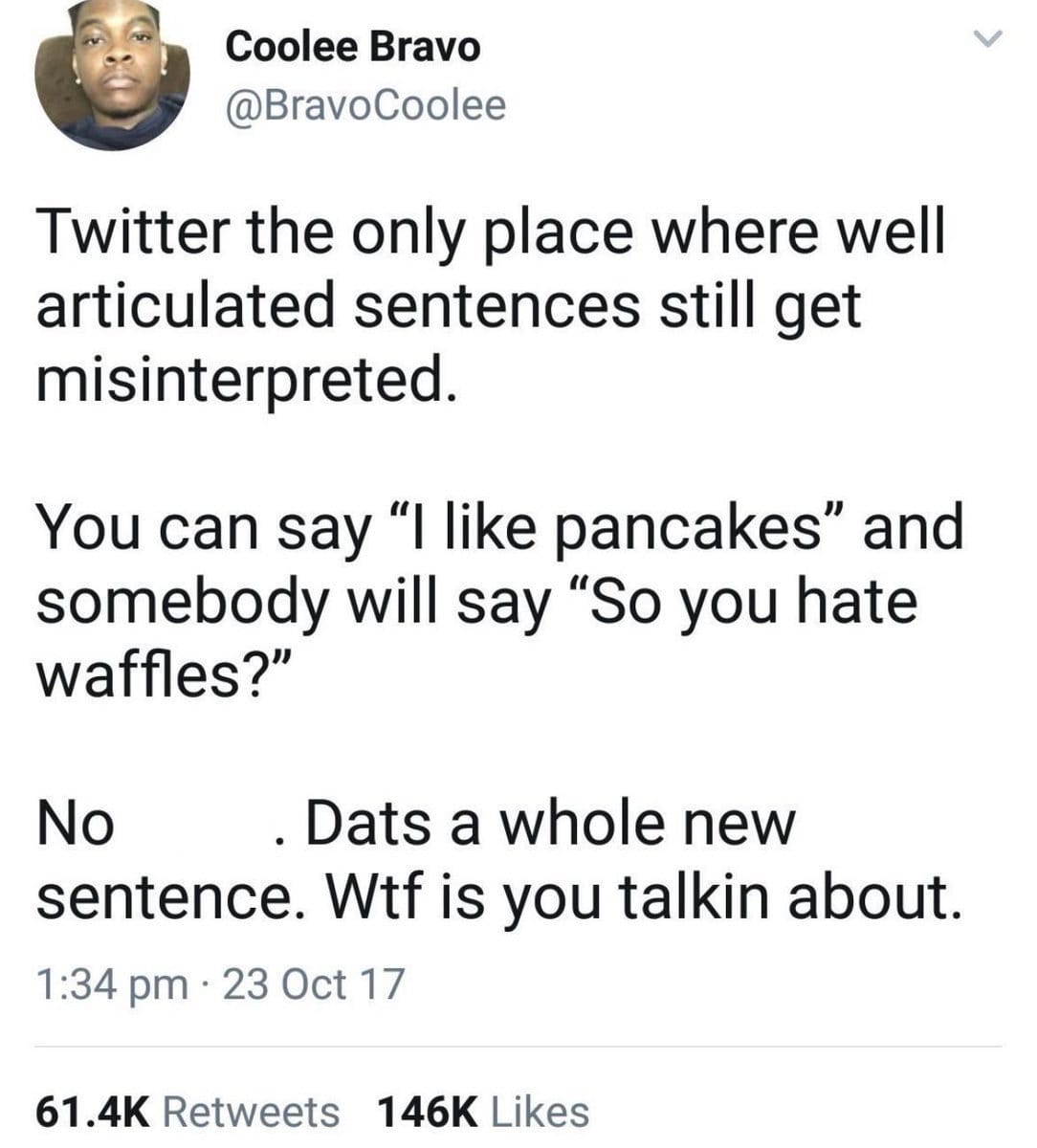
Be willing to forgive people on the first signs of making it right, and others will be equally as forgiving with our own mistakes.
Will DeadHappy Return?
I don't have any information about whether DeadHappy's going to make it. It seems like they're unable to gain more customers at this time, which is a death sentence (no pun intended) for a company with an inevitable churn rate.
Through sheer bad luck and a toxic outrage ecosystem, an entire team of people is likely out of a job during a very difficult economic period. It's bollocks, to borrow their phrase. And it's also a sad reminder that the Puritanical hand-wringing about ads being "edgy" still holds much power in modern society. Punching upward at the establishment sometimes means taking hits we're not prepared to receive.
Whoever the social media manager was behind this ad, I feel for you. What bad luck. Hope you're doing alright.
Even if DeadHappy isn't able to bounce back from this – which I hope they do – this story is going to haunt me for a long time. Every marketer's apparently one bad ad away from harming not just their own career, but potentially bringing down the entire company.


